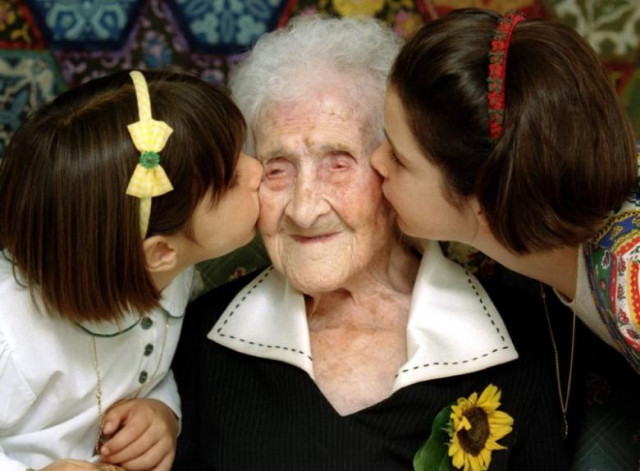Italian woman Emma Morano, 116, is recognised as the world's oldest living person
The World's oldest woman, Jeanne Calment, 120 years old, is kissed by two young girls during a special ceremony in a retirement home in Arles, Southern France, February 21, 1995. PHOTO: REUTERS
When she turned 120 years old in 1995, plucky Frenchwoman Jeanne Calment was asked what type of future she expected. "A very short one," she replied.
But Calment lived two more years, dying at age 122 with the longest documented lifespan of any person in history. Scientists who examined statistical trends regarding maximum lifespans said on Wednesday Calment's record may last a long time.
World’s oldest person dies in New York City, aged 116
An analysis of mortality and population data covering about 40 countries indicated humankind may already have hit its longevity ceiling, they said.
Average life expectancy continues to increase and more people are reaching extreme old age. But, the researchers said, people who reach 110 today have no greater life expectancy than those who lived to 110 in the 1970s. The age at death of the world's oldest person has not increased since Calment died in 1997.
The trend since then has been for the world's oldest person to reach around age 115, and the researchers predicted this would remain stable for the foreseeable future.
Japanese man, 96, becomes world’s oldest college graduate
"It is possible that someone might live slightly longer, but the odds of anybody in the world surviving to 125 in any given year is less than one in 10,000," said molecular geneticist Brandon Milholland of Albert Einstein College of Medicine, who helped lead the study published in the journal Nature.
"Despite any gains in the average life expectancy, there is a limit beyond which the maximum lifespan of humans cannot be extended," Milholland added.
Since the 19th century, life expectancy increases have been driven by factors including vaccines, antibiotics, improved treatments for cancer and heart disease, and better sanitation and nutrition. Infant and child mortality has fallen worldwide and life expectancies in developed countries now reach into the 70s and 80s.
126-year-old man dies in Parachinar
"We suspect that the accumulation of damage with age, especially mutations in the individual cells of the body, somatic mutations, ultimately places a limit on lifespan," Milholland said.
Medical research generally focuses on individual diseases, which does not extend maximum lifespan because lifespan-limiting damage affects all organs, Milholland said. So, for example, a treatment improving cardiac function would not prevent neurodegeneration.
"The odds are very slim that we will ever see a person who lives longer than Jeanne Calment," Milholland said. "And if we do ... they would probably not exceed her record by very much." Italian woman Emma Morano, 116, is recognised as the world's oldest living person.




















COMMENTS
Comments are moderated and generally will be posted if they are on-topic and not abusive.
For more information, please see our Comments FAQ